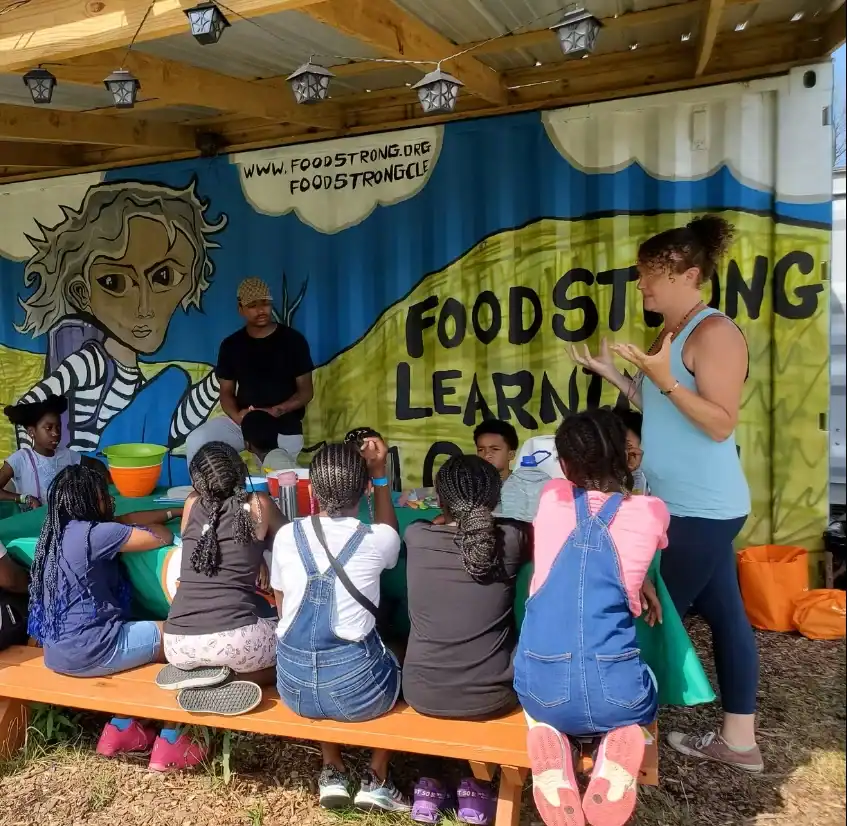- Youth Education
- Urban Restoration
- Community Engagement.
Clevelander Tackles Food Deserts With Community Solutions

Listen to this article
By Devon Jones
According to a 2018 study by Case Western Reserve University, limited access to affordable and nutritious food, affecting more than half of Cleveland residents who live in food deserts, contributes to chronic health issues across the city. To address this disparity, Food Strong, a nonprofit founded in 2018 by Sara Continenza, is working in neighborhoods like East Cleveland and around 66th and Superior Ave. to build food sovereignty through youth education, urban farming, and community partnerships.
What Is a Food Desert?
The U.S. Department of Agriculture defines a food desert as an area with limited access to affordable and nutritious food, particularly in predominantly lower-income neighborhoods. Cleveland experiences one of the nation’s largest disparities in food access, with more than 50 percent of residents living in a food desert, according to CWRU’s analysis of census data.
Cleveland’s Food Access Gap
For many Cleveland families, the nearest meal often comes from a corner store or fast-food chain rather than a grocery aisle filled with fresh fruits and vegetables.
Relying on packaged and processed food may be convenient, but over time, it increases the risk of diabetes, obesity, and high blood pressure. The Centers for Disease Control and Prevention reports that communities with limited food access face far higher rates of chronic illness, a reality that highlights just how urgent Cleveland’s food crisis has become.
Food Strong’s Mission and Vision
Food Strong’s mission is “to cultivate food justice in Northeast Ohio and beyond by building enduring local food systems from the ground up.” Founder Sara Continenza describes this work as advancing food sovereignty, “the right of people and communities to define their food and agricultural systems based on culturally appropriate and sustainable practices.”
Programs in Action: From Gardens to Markets
The nonprofit operates programs in three main areas:
Food Strong runs activities at the Coit Road Farmers Market in East Cleveland and the Superior Farm Fix-Up in Cleveland’s Superior neighborhood. These projects aim to connect residents with fresh produce, create hands-on gardening opportunities, and build stronger ties between families and local food systems.
Building Community Through Food Sovereignty
“We are seeking to build relationships and collaboration with residents and other community organizations,” Continenza said. “We are focused on long-term sustainable impact.”
Public health advocates support this grassroots approach, noting that food access is closely tied to health outcomes. “If we want to reduce rates of diabetes and heart disease in Cleveland, we must start by increasing access to fresh food,” said a representative from the Cuyahoga County Board of Health.
East Cleveland resident Maria Johnson, who shops weekly at the Coit Road Farmers Market, said Food Strong has changed how she cooks for her family. “Before, we ate a lot of packaged food because that’s what was around,” she said. “Now I can get fresh greens and tomatoes in my own neighborhood, and my kids are learning how to garden, too.”
Still, some policy experts question whether small-scale programs can meet the magnitude of Cleveland’s food crisis. They argue that without major investments in grocery infrastructure, zoning reforms, and expanded food assistance, nonprofits may only address part of the problem.
Community Impact
In neighborhoods where fresh groceries are scarce, the cost goes far beyond what shows up on a receipt. Families without access to healthy food often face higher medical bills, shorter life expectancies, and fewer opportunities to break the cycle of poverty. Programs like Food Strong can ease that burden by putting gardens and markets back into communities, but residents say the challenge is too big for nonprofits to solve alone. Real change will take both grassroots action and public investment. As Cleveland struggles with one of the nation’s starkest food access gaps, the question remains: will every neighborhood be given a fair chance at fresh, nutritious food?
Devon Jones is a research associate at Case Western Reserve University and program manager at the Cleveland Observer. He co-founded Crown Connections Nonprofit Consulting and co-hosts the Neighborhood Hero’s Podcast.



